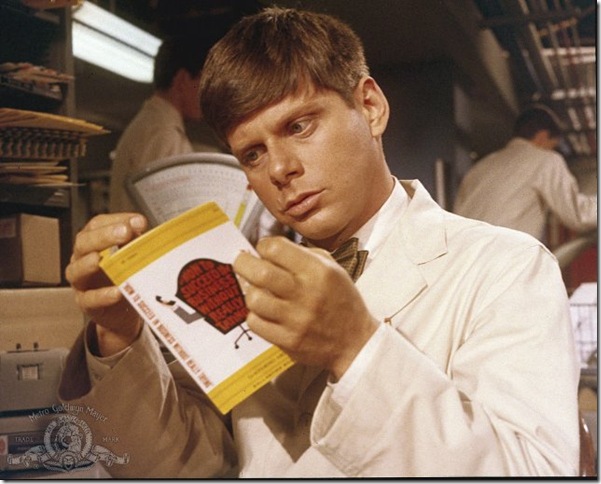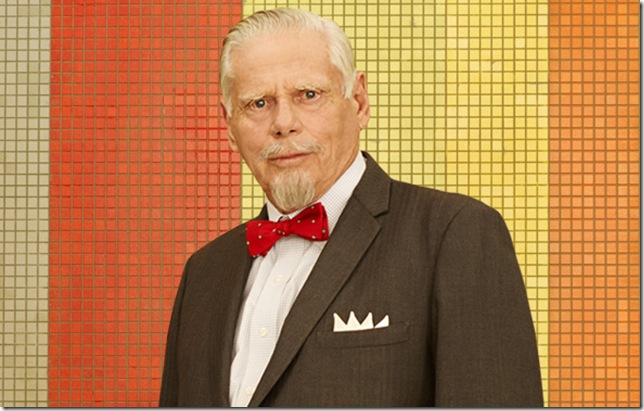He is featured in a documentary, Broadway: Beyond the Golden Age, to be screened in the 19th annual Palm Beach International Film Festival, and his résumé includes a handful of Hollywood films.
Still, Robert Morse is not really sure why he will be receiving the festival’s Lifetime Achievement Award.
“I am absolutely overjoyed,” he says. “To be honored, whatever that means, I’m grateful.” But, he concedes, “I was not a leading man. I did what I did, but I never could become a real big star. Maybe it was my gap tooth or my short height, or maybe it was being born at the wrong time. But there’s nothing to blame. Who knows why I didn’t become a movie star?”
Onstage, of course, it was another story entirely. Morse, now 82, was the quintessential twinkle-eyed youngster throughout the ’50s, appearing in The Matchmaker, Say, Darling, and attaining certified Broadway stardom in 1961 when he played eager-beaver corporate-climber J. Pierrepont Finch in the Pulitzer Prize-winning musical, How to Succeed in Business Without Really Trying.
The show’s success got Morse to Hollywood, where he scored a key role in 1965’s The Loved One, a caustic satire of the funeral industry, acting alongside Rod Steiger, Robert Morley and John Gielgud.
Two years later, Morse starred in the movie version of How to Succeed, a rare case of Hollywood having the good sense to use most of the original Broadway cast. After that, though, his film work consisted of second-banana roles in uninspired, light comedies such as A Guide for the Married Man and Where Were You When the Lights Went Out?
“I just went from one thing to another, but there was no master plan,” Morse says of his career, which has spanned nearly 60 years.
As to the milestone of turning 80, Morse says, “I try not to think about it too much. Everyone comes up and says, ‘Hey, you look good,’ and I say ‘Thank you.’ I have a very positive attitude, because I’ve been very fortunate at this age to be busy and working. So I don’t have time much to think about anything but taking my driver’s test again. And wondering if I can see the letters.
“I take it one day at a time, one foot in front of the other. Of course I’m not as fast as I used to be, but that’s OK,” he laughs. “Like I’m doing a benefit for Alzheimer’s this weekend,” he said last month. “It’s very strange. I can barely walk to the rehearsal, but as soon as I hear the music I think I’m 18 years old.”
After some fallow years in the ’80s, when Morse was reduced to touring in dinner theater and he struggled with alcoholism, he scored one of the great show business comebacks in the one-man show Tru, playing brooding, self-destructive Truman Capote. For the performance, he earned his second Tony Award, 28 years after his first, for How to Succeed.
Morse dismisses the notion of him drawing on parallels between Capote’s life and his own. “No, not necessarily. People would say to me, ‘Oh, I bet you read a lot of books on him,’ or ‘You must have seen him a lot.’ I’d say, ‘Well, to be very frank with you, I worked with a director and I worked with what was written, but it was mostly instinct.’ There was just something within me. I’m very proud of it.”
And in recent years, Morse has enjoyed a third career — or maybe it is his fourth — with a featured, frequently Emmy-nominated role on AMC’s Mad Men, playing Bert Cooper, a partner in the show’s ad agency.
He says of the drama’s creator, “Matt Weiner knew me, he remembered me, and there are many people that don’t. I think he likes me as a person and I think he cares about what comes out of my mouth.”
Asked if Bert will ever sing on the show, Morse responds, “Ah, jeez, I don’t know. I don’t think I’m going to be doing songs from ‘How to Succeed,’ but you never know. I’m still on in season seven, so we’ll see what happens.
“And even if I did know, I wouldn’t tell you,” he says. Weiner “does request firmly that nobody tell our agents, tell the press people anything about the show, because if things leak out, it spoils it for the general audience, he feels.”
Morse is also mum about his contributions to Broadway: Beyond the Golden Age, but for a different reason. “People ask me, ‘What did you say? What did you do? How was it?’ I don’t remember. It was a long time ago.”
Broadway: Beyond the Golden Age screens at 7 pm Monday, April 7, at the Cinemark Palace in Boca Raton, with the awards presentation to Robert Morse. The film can also be seen at 6:45 pm Wednesday, April 9, at the Muvico Parisian 20 at CityPlace in West Palm Beach. For more information, visit pbfilmfest.org.

